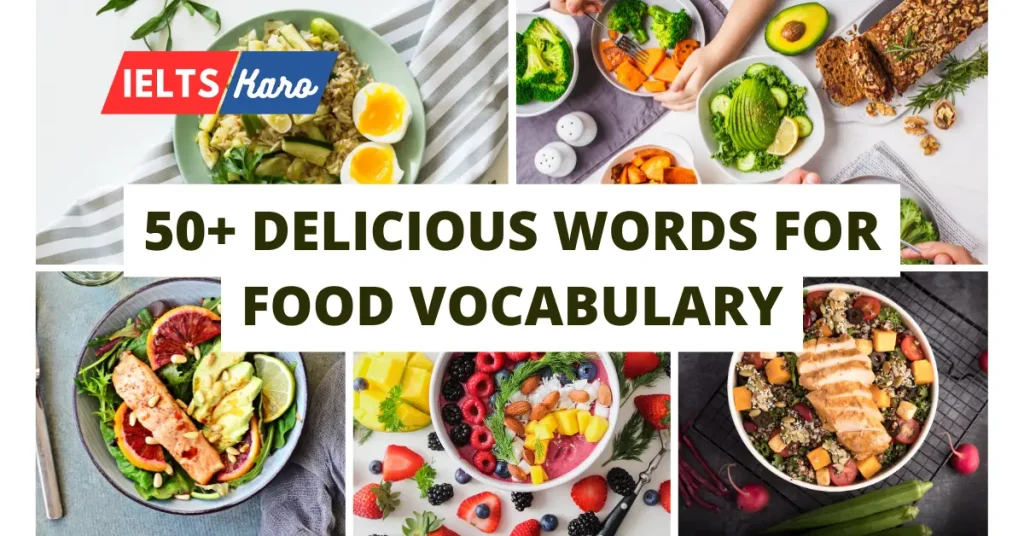Food Vocabulary for IELTS Writing and Speaking
Food is a universal language, and it’s also a common topic in IELTS Speaking and Writing exams. Whether you’re discussing your favorite cuisine, describing a memorable meal, or analyzing a food-related text, a strong vocabulary can significantly boost your score. In this blog post, we’ll delve into a variety of food-related words, from common to niche, that can help you ace your IELTS exams.
Common Food Vocabulary
Let’s start with some basic food vocabulary that you’re likely already familiar with. However, it’s important to use these words accurately and in context.
| Word | Part of Speech | Meaning | Example Sentence |
|---|---|---|---|
| Cuisine | Noun | Style of cooking | French cuisine is renowned for its rich sauces and delicate flavors. |
| Dish | Noun | Prepared food | This dish is a family recipe, passed down through generations. |
| Ingredient | Noun | Substance used in cooking | The key ingredient in this soup is fresh tomato. |
| Recipe | Noun | Set of instructions for cooking | I found a delicious recipe for vegan lasagna online. |
| Flavor | Noun | Distinctive taste | The flavor of this wine is complex and intriguing. |
| Texture | Noun | Feel of food | The texture of this cake is light and fluffy. |
| Appetizer | Noun | Small dish served before a meal | We started with a delicious shrimp cocktail as an appetizer. |
| Entrée | Noun | Main course of a meal | The entrée was a succulent roast beef. |
| Dessert | Noun | Sweet course served after a meal | For dessert, we had a decadent chocolate cake. |
| Beverage | Noun | Drinkable liquid | Coffee is my favorite beverage in the morning. |
Less Common Food Vocabulary
It is time to to expand your vocabulary beyond common terms. Let’s explore some less common but equally useful food-related words that can help you in achieving a higher brand score:
| Word | Part of Speech | Meaning | Example Sentence |
|---|---|---|---|
| Gourmand | Noun | Person who enjoys eating | He’s a true gourmand, always on the lookout for the next culinary adventure. |
| Epicurean | Adjective | Devoted to refined and luxurious living, especially eating and drinking | An epicurean delight, this truffle-infused pasta dish is a must-try. |
| Gastronomy | Noun | Art or science of good eating | French gastronomy is world-renowned for its exquisite dishes. |
| Culinary | Adjective | Relating to cooking | She attended a prestigious culinary school to hone her skills. |
| Savory | Adjective | Pleasing to the taste, not sweet | This savory pie is filled with a hearty mixture of vegetables and herbs. |
| Umami | Noun | One of the five basic tastes, often described as savory or brothy | The umami flavor in this dish comes from the aged soy sauce. |
| Delectable | Adjective | Delicious | The dessert was a delectable chocolate mousse. |
| Scrumptious | Adjective | Delicious | This scrumptious meal was the highlight of our trip. |
| Palatable | Adjective | Pleasant to the taste | The food was simple but quite palatable. |
| Succulent | Adjective | Juicy and tender | The steak was cooked to perfection, juicy and succulent. |
Tips for Using Food Vocabulary in IELTS
- Practice, Practice, Practice: The more you practice using these words, the more natural they will become.
- Use Them in Context: Don’t just memorize words; understand their usage in different contexts. For example, you could say “I had a succulent steak dinner last night” or “The texture of the cake was light and fluffy.”
- Read Food Blogs and Articles: This is a great way to encounter new food vocabulary and learn how to use it effectively. Look for blogs and articles that use a variety of vocabulary, including both common and less common words.
- Watch Food Programs: Pay attention to the language used by chefs and food critics. They often use a wide range of vocabulary to describe food, and you can learn a lot by listening to them.
- Use a Thesaurus: A thesaurus can help you find synonyms for words you already know, expanding your vocabulary. For example, if you know the word “delicious,” you could look up synonyms like “scrumptious,” “palatable,” and “mouthwatering.”
- Keep a Vocabulary Journal: Write down new words you learn, along with their meanings and example sentences. This will help you review and remember the words.
- Use Mnemonic Devices: Create mnemonic devices to help you remember new words. For example, you could create a sentence using the first letter of each word in a list of vocabulary words.
- Practice Speaking and Writing: The more you use the words, the better you will become at using them correctly. Practice speaking and writing about food topics, using the vocabulary you have learned.
- Take IELTS Practice Tests: IELTS practice tests often include topics related to food. This is a great opportunity to use the vocabulary you have learned.
- Get Feedback from a Teacher or Tutor: A teacher or tutor can provide you with feedback on your use of vocabulary and help you identify areas where you need to improve.
By incorporating these food vocabulary words into your IELTS preparation, you can significantly enhance your language skills and boost your overall score. Bon appétit!





